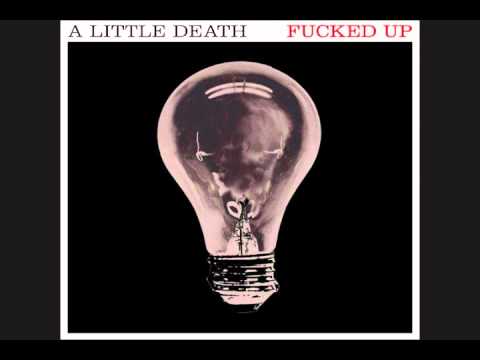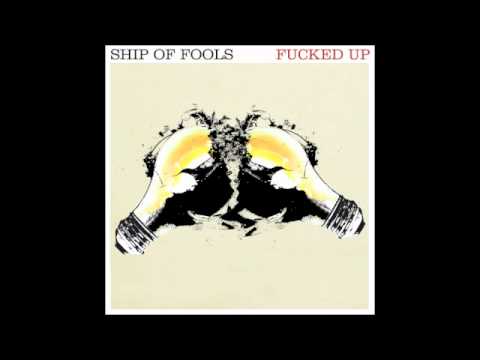Fucked Up’s Damian Abraham is a punk rock iconoclast, a kind of Bizarro GG Allin for the 21st century. He’s blessed with the same ineffable stage presence and reckless abandon that Allin had, but unlike a Murder Junkies show, the atmosphere at a Fucked Up gig is overwhelmingly positive. Sure, there’s plastic cups being crushed against foreheads to be worn like unicorn horns and various states of male nudity, but there’s also hugging, singalongs, and some of the most good-natured moshing one could imagine.
Where Fucked Up shows are an even bigger departure from GG Allin shows, though, is the music. That is to say, it’s good. Very good, in fact. And while Damian commands the most attention with his stage antics and boisterous interview personality, Fucked Up is every bit as much the band of drummer Jonah Falco, guitarists Mike Haliechuk, Josh Zucker, and Ben Cook, and bassist and backing vocalist Sandy Miranda. At the Stag & Dagger Festival gig the Toronto band headlined at the Village Underground, the majority of the sold out audience spent the set watching out for Damian as he stormed through the crowd, while the band stood on stage and proficiently blasted through an hour of technically precise and disarmingly melodic hardcore punk practically unnoticed. It was, to be honest, a little sad.
As we walked to the Shoreditch car park that would be the site of our pre-show chat, Sandy joked that she "can’t get a word in edgewise" when she and Damian sit in interviews together. It’s a shame – she’s clever, funny, and engaging, but infinitely more reserved than her fellow Fucked Up vocalist. She sat down with a newspaper full of fish and chips and sucked on a cigarette while we spoke about her band’s forthcoming rock opera David Comes to Life, the bad rap concept albums get from the music press, and the challenges Fucked Up continues to issue to the punk community.
David Comes to Life is set in England. What attracted the band to putting the story here?
Sandy Miranda: Well, England, as you know, has a history of pop music and of music in general. People here tend to have a great appreciation of music and of the arts, so we wanted to sort of pay tribute to an era that we love as fans of punk and as fans of music. So yeah, it felt like a good place to set it.
What attracted you to the rock opera format for this record?
SM: We try and do things differently every time we go in working on a new idea. We’ve also done a lot of different formats. 7"s, 12"s, 10"s, 8-tracks, reel-to-reel. So we thought, why not play with the style of writing and make it more-narrative based? So really, that’s what it was. We’ve been doing this for 10 years and the last thing we want to do is play with the same things, so this was just another way that we could experiment and also see if we could even pull it off.
Speaking to the narrative of the album, in the trailer, there’s a bit where you guys are attempting to retell the story…
SM: Oh God…
…and you all kind of stumble. So my question is, if the band is struggling to understand the story, should audiences bother?
SM: It’s up for interpretation. Following the lyrics, you’re not gonna get the story fully, you know what I mean? You still have to sort of piece it together. You’ll have your points A, B, and C but then it’s up to you to find your way between all of those points. But really it’s just a story of love and of lost love and of revelation – just very classic themes. We’re not really rebuilding the wheel here or anything. We’re just trying to see what else we could do.
Working with narrative structure as well as having a 78-minute punk record, are you challenging punk audiences with this?
SM: Yeah, pretty much. I mean, I’m challenging myself. I’ve been listening to the record and it’s kind of intense for me to listen to it completed. But no, music should be challenging, and I feel like you shouldn’t really like creative ventures right away. I feel that to gain a full appreciation of a creative feat you need to sort of struggle with it, and be kind of unsure of your stance. I’ll be glad if people have a hard time dealing with the record because that means they’re thinking about it.
Concept albums take a lot of shit as being a pretentious form. Why do you think that is, and do you hope to challenge that perception?
SM: I guess maybe some find concept records pretentious… but I don’t know why they would. What’s the big deal about it? Instead of writing one song about something, you’re writing multiple songs about a variety of themes, all of which are interconnected, just like they are in life. Is that pretentious? I don’t think it’s pretentious. I just think it’s a different thing. It’s just a different way to create music.
I think that’s the right answer to that question. What are some of your personal favorite concept records?
SM: God. The classics, I guess. Is Pet Sounds a concept album? I think it is. I read a bio where they said each song, start to finish, reflects a stage in a relationship. You meet someone and you get excited – ‘Wouldn’t It Be Nice’ – it’s all rose-colored glasses, talking about your wedding, and by the end of it – ‘Caroline, No’ – that’s basically about a breakup. So that’s one of my favorite concept records, but it’s also one of the earliest defining concept records. Back then, what was it – 1966? The album as a format was still quite new then. So I’d say that’s a pretty good model for a concept record. And I guess later on came Tommy and all that stuff which takes narrative to a whole other level, but I like the looseness of Pet Sounds.
So I’ve never heard you say this personally in the press, but other members of your band have been open about Fucked Up having an expiry date, and that this record is in some ways an ultimate statement in terms of the full-length format. Is the end near?
SM: You know, the end has always been near. Every year I thought would be my last, no questions asked. The end is definitely near. It may not be as near as I thought it was. It may not be one year, but I think it might be two more years and then we’ll be done. I mean, who knows? I think it’s best to expect the least and hope for the best. If you think every year is going to be your last, you’re going to enjoy that year that much more. So I tend to have low expectations for that very reason.





